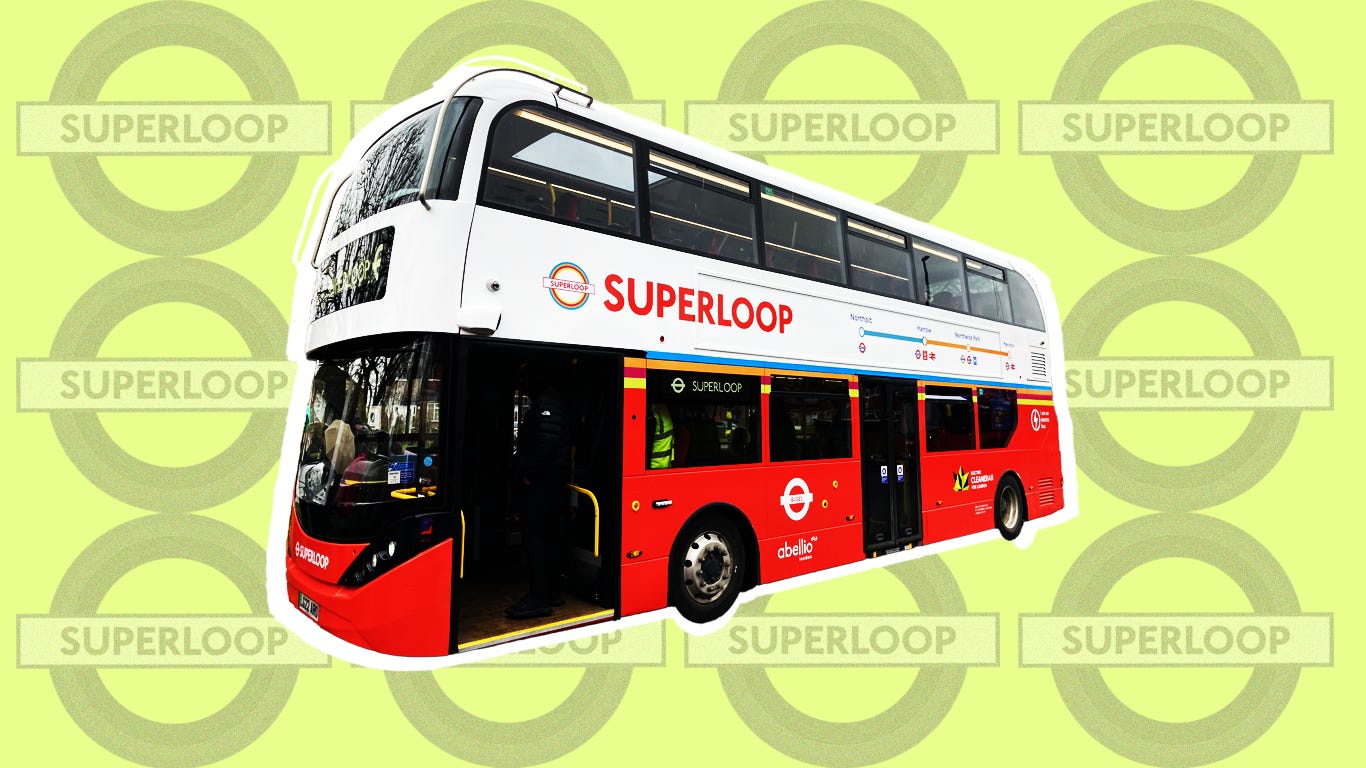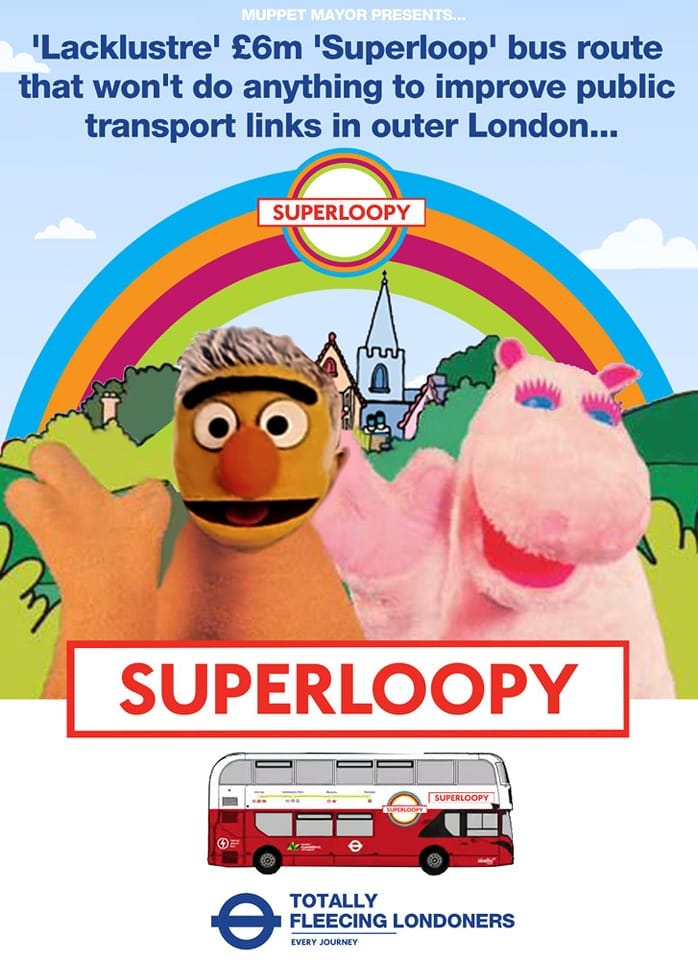Four big questions for the Superloop
Will it placate the anti-ULEZ campaign? Can TfL even afford it?
Morning — it’s been a great week for London’s transport geeks. Just as we thought the city was entering a drought of new projects after the opening of the Elizabeth Line, Superloop was announced on Tuesday with much fanfare. But there are a lot of questions about the plans — we’ve got a deep dive for you after your midweek briefing below.
In case you missed it: our issue last Sunday has everything you need to know about the damning review of the Metropolitan Police’s culture and standards. Since then Baroness Casey, who penned the report, expressed her disappointment this week about the Met’s reluctance to accept its problems with racism, sexism and homophobia are “institutional”.
By the way: a huge welcome to all our new subscribers from the Media Democracy Festival. It was great to meet everybody and hear all the big ideas for the future of independent media in the UK. We’re excited to see what part the Spy can play in London — so if you fancy it, it would be great for you to share and help us get the word out.
What we’ve spied
✈️ A battle is brewing over plans to ramp up flights at London City Airport. The mayor’s office has officially said it opposes lifting the ban at the airport on flights at the weekend. The airport wants to offer “more leisure routes” and bring in flights from “more distant locations”, but campaigners fear the environmental impact.
😔 Tributes are being paid to TV presenter Paul O’Grady, who died on Wednesday. O’Grady’s drag persona Lily Savage was a regular fixture at Royal Vauxhall Tavern in south London in the 1980s and 1990s — one MP has recalled the time when the venue was raided by police during one of O’Grady’s performances.
🚨 Councils in London have warned that plans to force thousands of Afghan refugees out of hotels risk making them homeless. London Councils, the umbrella organisation for local authorities in the capital, said boroughs were “very concerned by the lack of alternative housing options for Afghan evacuee families who are being asked to leave hotels”.
🏚️ The housing secretary has urged a cladding and insulation manufacturer whose products were involved in the Grenfell Tower fire to help fund fixes for other unsafe blocks. Michael Gove wrote in a letter to the Irish firm Kingspan that it should provide a package of financial support along with the other construction product manufacturers. Related: Oscar-winning film director Steve McQueen is soon releasing an “unflinching film” of the burnt-out ruin of Grenfell Tower.
🦖 The dorky dinosaurs at Crystal Palace Park are getting much-needed regeneration cash. The Victorian-era statues, based on early ideas of how dinosaurs looked, have won National Lottery funding to help reverse their rapid deterioration.
Going Superloop-y
The Superloop is coming to London. A rollercoaster? A new type of crisp? No – it's TfL's first orbital bus network. Complete with its own map, flashy logo and custom bus paint job, the Superloop is a new network of express bus services that could circle the entire capital, connecting all of the big town centres and transport hubs in outer London, with a few offshoots into the capital’s centre.
So what's planned? Some of its routes will be brand new — North Finchley to Walthamstow in the north, Croydon to Bromley in the south. Others already exist, like the express routes between Russell Square to West Croydon and Heathrow Airport to Harrow. But they’ll all be getting the Superloop makeover as well as more frequent bus timetables. You can see the proposed map here.
What sets Superloop apart from traditional routes is that it'll have ‘express’ buses — ones that have fewer stops than your typical London bus. Rather than pulling over every couple of minutes so everyone can get on and off, they’ll beeline between major hubs. We guess it’ll be like that joyous feeling of riding a London bus in the dead of night, where you fly past all the usual stops. Superloop buses will have the same price as existing fares — currently £1.75 — and also benefit from the Hopper fare, meaning you can switch to another, normal bus within the hour for free.
The plans were announced on Tuesday by mayor Sadiq Khan. It’s a big break from the transport orthodoxy in London, which up to now has all been about funnelling as many people as possible into the centre of the city. With working from home on the rise, many Londoners are more interested in popping to another suburban town centre than the city centre. But the idea has been floated for a while — former mayor Boris Johnson included an orbital bus network in his manifesto but never got around to implementing it.
Why now? Superloop’s announcement comes at a time when mayor Sadiq Khan is expanding London’s ultra-low emissions zone, meaning you’ll have to pay a £12.50 daily charge no matter where you are in the city if your car is too polluting. ULEZ is currently only in force in inner London, but from the end of August, it’ll stretch to the entirety of the Greater London boundary. However, the Londoners living out there have rightly pointed out there transport links are nowhere near as good as those living in the centre of the city. So Khan hopes introducing Superloop will make the transition away from cars a bit easier.
What stage is it at? So far TfL has just announced the consultation for the first of the 10 eventual Superloop routes — North Finchley to Harrow. It then has to consult on the rest of the quadrants of the loop, bit by bit. There’s no official word on when that will all be wrapped up, but the BBC’s Tom Edwards reports the expectation is roughly 18 months.
Everything’s all rather high-level at the moment though — we don’t have many more details than the above. Here are four big questions we think City Hall and TfL still need to answer:
1. How does it address the anti-ULEZ campaign’s concerns? “Only the biggest curmudgeon could be against the wonderful Superloop,” Khan told a reporter at the launch event on Tuesday. He likely had a particular group in mind — some of those campaigning against the ULEZ expansion at the moment. You might have read our recent issue of the Spy where we reported on Khan’s explosive run-in with anti-ULEZ campaigners at a public town hall a few weeks ago. People are angry about the expansion, saying they lack the financial support to replace their cars and expressing doubt that air pollution is a big enough problem in outer London anyway. Khan has quite the fight on his hands, with things escalating this week amid reports protestors are covering the cameras TfL will use to enforce ULEZ with plastic bags.
So it’s not surprising to see some saying the Superloop is too little too late. For one thing, there’s no chance it will be ready in time for ULEZ coming into force in August. And we don’t think we’re going out on too much of a limb to say Superloop isn’t a solution for everybody. A plumber can’t exactly hop on an express bus for work. And it’s not really a solution for the disabled, who might need a specialised vehicle to get around. For their part, London Conservatives, who are leading the political charge against the ULEZ expansion, are nonplussed. They’ve branded the Superloop a ‘Superflop’.
2. Does TfL even have enough money for Superloop? One thing missing from the Superloop announcement was any word on a sizeable amount of cash to fund it. The promotional material did mention that City Hall is earmarking at least £6m for bus improvements in outer London. But as others have pointed out, that’s not nearly enough for a huge new orbital network — it’s likely only enough for the branding.
And TfL is already facing a tricky financial situation at the moment, with fare revenues taking a huge hit during the pandemic and the UK government playing hardball. After Khan agreed TfL’s latest funding deal with the transport secretary in August 2022, he actually warned that bus services would have to be cut in the capital. What’s changed since then?
3. Will it really be a loop? Superloop isn’t being signed off all in one go. Instead, TfL is consulting on each of the ten routes individually. That leaves open the possibility that one or more could be revised, or potentially even scrapped. There’s already a fuss being kicked up about some of the outer boroughs not getting a stop on the initial map — like Barking and Dagenham, Havering, Merton, Hounslow and Richmond upon Thames. If there’s enough lobbying for significant changes, perhaps we’ll end up with more of a Supersquiggle. It’s also not clear how continuous the loop will actually be — will passengers have to get off and switch whenever they reach the end of one individual route?
4. Does it make up for other bus cuts? According to the promotional material, the Superloop will be adding an extra 4 million miles to London’s bus network. But even taking that at its word, over the longer term London’s buses have taken a much bigger dent over the past few years. Research commissioned by the Liberal Democrats and conducted by the House of Commons Library found that London buses covered 12 million fewer miles than they did in 2016. More than 1,100 vehicles were taken out of operation during the same period. It’s not entirely clear whether Superloop fully recoups those losses.
Anyway, hopefully we’ll get more answers soon. If you fancy having your say on Superloop in the meantime, the official consultation page is here.







